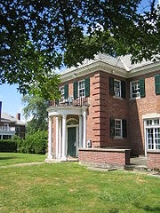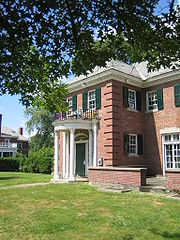
Kappa Kappa Kappa
Encyclopedia

Fraternities and sororities
Fraternities and sororities are fraternal social organizations for undergraduate students. In Latin, the term refers mainly to such organizations at colleges and universities in the United States, although it is also applied to analogous European groups also known as corporations...
at Dartmouth College
Dartmouth College
Dartmouth College is a private, Ivy League university in Hanover, New Hampshire, United States. The institution comprises a liberal arts college, Dartmouth Medical School, Thayer School of Engineering, and the Tuck School of Business, as well as 19 graduate programs in the arts and sciences...
in Hanover, New Hampshire
Hanover, New Hampshire
Hanover is a town along the Connecticut River in Grafton County, New Hampshire, United States. The population was 11,260 at the 2010 census. CNN and Money magazine rated Hanover the sixth best place to live in America in 2011, and the second best in 2007....
. The fraternity founded in 1842 is the second-oldest fraternity at Dartmouth College and the oldest local fraternity in the nation. Its house is at 1 Webster Avenue.
Despite offers to establish additional branches at other institutions, the brotherhood has remained a single-school institution for the duration of its history and is not a chapter of any national organization. Today it is one of the many recognized Dartmouth College Greek organizations
Dartmouth College Greek organizations
Dartmouth College is host to many Greek organizations and a significant percentage of the undergraduate student body is active in Greek life. In 2005, the school stated that 1,785 students were members of a fraternity, sorority, or coeducational Greek house, comprising about 43 percent of all...
.
The organization has no affiliation with the post-American Civil War Ku Klux Klan
Ku Klux Klan
Ku Klux Klan, often abbreviated KKK and informally known as the Klan, is the name of three distinct past and present far-right organizations in the United States, which have advocated extremist reactionary currents such as white supremacy, white nationalism, and anti-immigration, historically...
, which first formed 24 years later (in 1866) and adopted Roman-alphabet initials, “KKK”, similar to the Greek letters of Tri-Kap.
Early history
Dartmouth College was founded by Eleazar WheelockEleazar Wheelock
Eleazar Wheelock was an American Congregational minister, orator, educator, and founder of Dartmouth College....
in 1769. Fourteen years later the first student society came into existence, and student societies and the College have been intertwined ever since.
For much of the late 18th and early 19th centuries, two societies vied for preeminence: the "Socials" (officially the Society of Social Friends, est. 1783) and the "Fraters" (the United Fraternity, est. 1786). By 1815, half of the College were members, and a fierce competition existed between the two in order to attract the finest students.
In 1842, a dispute arose within the Fraters as to a vote for the organization's leadership. The fracture resulted in the formation of Psi Upsilon, by those who supported John Tyler in the contest, and Kappa Kappa Kappa, by those who supported Harrison Hobart.
The Society
Tri-Kap was founded on July 13, 1842, by Hobart and two of his close companions, Stephen Gordon Nash and John Dudley Philbrick. The society was based on the principles of Democracy, loyalty to Dartmouth, and equality of opportunity. Originally a literary and debating society, in 1905 Tri-Kap officially became a social society and has remained so ever since.Physical Plants
Tri-Kap was the first student society at Dartmouth with its own meeting place, a building called The Hall that originally was located where the Hopkins Center for the ArtsHopkins Center for the Arts
Hopkins Center for the Creative and Performing Arts at Dartmouth College is located at 2 East Wheelock Street in Hanover, New Hampshire. The center, which was designed by Wallace K. Harrison and foreshadows his later design of Manhattan’s Lincoln Center, is the college’s cultural hub. It is home...
stands today. Opened on July 28, 1860, the Hall served as Tri-Kap's home until the Society moved into the Parker House in 1894, located where the modern-day Silsby Hall stands. In 1923, the Society moved into 1 Webster Avenue, where it resides to this day.
Modern History
Since 1905, when it officially became a social society, Tri-Kap has remained popular on the Dartmouth campus. Currently, Tri-Kap is one of Dartmouth's largest and most popular fraternities with over 60 brothers hailing from all over the country and internationally as well.Famous alumni
- Alex M. AzarAlex AzarAlexander M. Azar II was appointed by George W. Bush as the Deputy Secretary of the U.S. Department of Health and Human Services . Before this appointment, Mr. Azar served as General Counsel at HHS....
1988, Deputy Sec. of U.S. Dept. of Health and Human Services - Peter RobinsonPeter Robinson (speechwriter)Peter Mark Robinson is an American author, research fellow, television host and former speechwriter for then-Vice President George H.W. Bush and President Ronald Reagan. He is currently the host of Uncommon Knowledge, an interview show by Stanford's Hoover Institution. He is also a research fellow...
1979, White House Speechwriter for Ronald Reagan - Nick LoweryNick LoweryDominic Gerald Lowery , nicknamed Nick the Kick, is a former American football placekicker for the New England Patriots , the Kansas City Chiefs , and New York Jets . Lowery was selected to the Pro Bowl three times and when he retired was ranked first in field goal percentage and also had the most...
1978, three-time Pro Bowl kicker. - David Shribman 1976, Pulitzer Prize winner
- John F. Lundgren 1973, Director, President and Chief Executive Officer of Stanley Black & Decker, a Fortune 500 Company
- Mark Dillen Stitham 1972, actor Hawaii TV series [Jake & the Fatman, Raven, Unsolved Mysteries, Lost]
- Douglas Walgren 1963, U.S. Congressman from Pennsylvania
- David RosenbaumDavid RosenbaumDavid E. Rosenbaum was an American journalist.After his education, Rosenbaum worked for a number of publications including the St. Petersburg Times and the Congressional Quarterly. He worked for the New York Times for thirty-five years beginning in 1968...
1963, New York Times Journalist - Nitya Pibulsonggram 1962, Foreign Minister of Thailand and former Thai Ambassador to the United States
- Dr. BobBob Smith (doctor)Robert Holbrook Smith was an American physician and surgeon who co-founded Alcoholics Anonymous with Bill Wilson, more commonly known as Bill W. He was also known as Dr. Bob. He was born in St. Johnsbury, Vermont, where he was raised, to Susan A. Holbrook and Walter Perrin Smith...
1902, Co-Founder of Alcoholics AnonymousAlcoholics AnonymousAlcoholics Anonymous is an international mutual aid movement which says its "primary purpose is to stay sober and help other alcoholics achieve sobriety." Now claiming more than 2 million members, AA was founded in 1935 by Bill Wilson and Dr. Bob Smith in Akron, Ohio... - Channing H. CoxChanning H. CoxChanning Harris Cox was a Massachusetts Republican politician and the 49th Governor of Massachusetts born in Manchester, New Hampshire....
1901, Governor of Massachusetts - Sherman Burroughs 1894, U.S. Congressman from New Hampshire
- John BarrettJohn BarrettJohn Barrett is the name of:* John Barrett , Irish track and field athlete who represented Great Britain at the 1908 Summer Olympics* John Barrett , Australian Senator...
1889, U.S. Minister to Siam, the Argentine Republic, Panama, & Colombia - Winfield Scott HammondWinfield Scott HammondWinfield Scott Hammond was an American politician. He was a Democrat.Born in 1863 in Southborough, Massachusetts, he served from Minnesota in the United States House of Representatives in the 60th,...
1884, Governor of Minnesota - Samuel D. FelkerSamuel D. FelkerSamuel Demeritt Felker was an American lawyer and Democratic politician from Rochester, New Hampshire. He served as mayor of Rochester and in the New Hampshire state House of Representatives before being elected Governor in 1912.-External links:*...
1882, Governor of New Hampshire - Samuel Walker McCall 1874, Governor of Massachusetts
- Irving Webster Drew 1870, U.S. Senator from New Hampshire
- Henry Eben Burnham 1865, U.S. Senator from New Hampshire
- Henry Moore BakerHenry Moore BakerHenry Moore Baker was a U.S. Representative from New Hampshire.Born in Bow, near Concord, New Hampshire, Baker attended the common schools, as well as Pembroke, Tilton, and Hopkinton Academies in New Hampshire...
1864, U.S. Congressman from New Hampshire - Col. Frank Haskell 1854, wrote famous first-hand account of the battle of Gettysburg
- Charles Henry Bell 1844, U.S. Senator and Governor of New Hampshire
- Ambrose A. Ranney 1844, U.S. Congressman from Massachusetts
- Benjamin Franklin Flanders 1842 (honorary), Governor of Louisiana
- Daniel Clark 1834 (honorary), U.S. Senator
- Rufus ChoateRufus ChoateRufus Choate , American lawyer and orator, was born in Ipswich, Massachusetts, a descendant of an English family which settled in Massachusetts in 1643. His first cousin, physician George Choate, was the father of George C. S. Choate and Joseph Hodges Choate...
1819 (honorary), U.S. Senator - Levi WoodburyLevi WoodburyLevi Woodbury was an Associate Justice of the Supreme Court of the United States, a U.S. Senator, Governor of New Hampshire and cabinet member in three administrations. He was the first Justice to have attended law school....
1809 (honorary), Gov. of New Hampshire, U.S. Senator, Sec. of the Treasury, and U.S. Supreme Court Justice - Daniel WebsterDaniel WebsterDaniel Webster was a leading American statesman and senator from Massachusetts during the period leading up to the Civil War. He first rose to regional prominence through his defense of New England shipping interests...
1801 (honorary), U.S. Senator, Congressman, and Secretary of State - Lewis CassLewis CassLewis Cass was an American military officer and politician. During his long political career, Cass served as a governor of the Michigan Territory, an American ambassador, a U.S. Senator representing Michigan, and co-founder as well as first Masonic Grand Master of the Grand Lodge of Michigan...
(honorary), Governor of Michigan, U.S. Senator, and Presidential nominee

